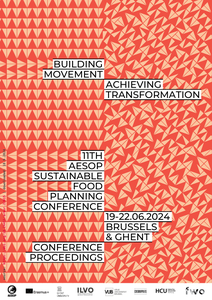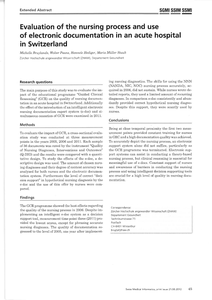This article proposes a strategy for Switzerland to change the goal from HIV control to HIV elimination. In Switzerland, HIV treatment is well organized and available for all with good access. An important challenge that obstructs prevention is the new infections originating from people who are unaware of their status. Since the majority of new infections in Switzerland are within the group of men who have sex with men (MSM), this strategy targets MSM who do not know their HIV status and engage in risky sexual behavior.
MULTIFILE
Background: Concepts such as participation and environment may differ across cultures. Consequently, to use a measure like the Participation and Environment Measure for Children and Youth (PEM-CY) in other than the original English-speaking contexts, cultural adaptation needs to be assured. The aim of this study was to cross-culturally translate and adapt the PEM-CY into German as it is used in Germany, Austria and Switzerland. Methods: Fifteen parents of children and adolescents with disabilities from three German speaking countries participated in three rounds of think-aloud interviews. We followed the procedure of cultural equivalence guidelines including two additional steps. Data was analyzed by content analysis using semantic, idiomatic, experiential and conceptual equivalence. Results: Results show adaptations mainly focused on experiential and conceptual equivalence, with conceptual equivalence being the most challenging to reach. Examples of experiential equivalence included adapting the examples of activities in the PEM-CY to reflect those typical in German speaking countries. Conceptual equivalence mainly addressed aspects of “involvement” and “environment” of children and adolescents and was reached through adaptations such as enhanced instructions and structures, and additional definitions. Conclusions: This study presents a cross-cultural translation and adaptation process to develop a German version of the PEM-CY that is suitable for Germany, Austria and Switzerland. Using a modified cultural adaptation process, a culturally adapted version of PEM-CY (German) is now available for research, practice and further validation.
DOCUMENT

Background: Concepts such as participation and environment may differ across cultures. Consequently, to use a measure like the Participation and Environment Measure for Children and Youth (PEM-CY) in other than the original English-speaking contexts, cultural adaptation needs to be assured. The aim of this study was to cross-culturally translate and adapt the PEM-CY into German as it is used in Germany, Austria and Switzerland. Methods: Fifteen parents of children and adolescents with disabilities from three German speaking countries participated in three rounds of think-aloud interviews. We followed the procedure of cultural equivalence guidelines including two additional steps. Data was analyzed by content analysis using semantic, idiomatic, experiential and conceptual equivalence. Results: Results show adaptations mainly focused on experiential and conceptual equivalence, with conceptual equivalence being the most challenging to reach. Examples of experiential equivalence included adapting the examples of activities in the PEM-CY to reflect those typical in German speaking countries. Conceptual equivalence mainly addressed aspects of “involvement” and “environment” of children and adolescents and was reached through adaptations such as enhanced instructions and structures, and additional definitions. Conclusions: This study presents a cross-cultural translation and adaptation process to develop a German version of the PEM-CY that is suitable for Germany, Austria and Switzerland. Using a modified cultural adaptation process, a culturally adapted version of PEM-CY (German) is now available for research, practice and further validation.
DOCUMENT

Tipping is a social norm in many countries and has important functions as a source of income, with significant social welfare effects. Tipping can also represent a form of lost tax revenue, as service workers and restaurants may not declare all cash tips. These interrelationships remain generally insufficiently understood. This paper presents the results of a comparative survey of resident tipping patterns in restaurants in Spain, France, Germany, Switzerland, Sweden, Norway, and the Netherlands. ANOVA and ANCOVA analyses confirm significant variation in tipping norms between countries, for instance with regard to the frequency of tipping and the proportion of tips in relation to bill size. The paper discusses these findings in the context of employment conditions and social welfare effects, comparing the European Union minimum wage model to gratuity-depending income approaches in the USA. Results have importance for the hospitality sector and policymakers concerned with social welfare
MULTIFILE
Citizens living in food poverty can easily get caught up in a vicious cycle. Socio-economically disadvantaged people often rely on food assistance and are more likely to suffer from diseases caused by unhealthy diets, such as diabetes. They may also experience isolation and lack social networks, as they do not have the financial means to participate in social life. Moreover, this group is often overlooked in decision-making processes regarding healthy and sustainable food environments. To create equitable food environments in urban areas, it is crucial to incorporate the everyday challenges and needs of socioeconomically disadvantaged people. In our collaborative research, we explore the needs of socioeconomically disadvantaged people regarding a healthy and sustainable diet in Switzerland and the Netherlands. The aim is also to develop, in a participatory way, ideas on how to create more socially just and inclusive food environments.Keywords: food poverty, food environments, social participation, participatory action research
DOCUMENT

Energy efficiency has gained a lot of prominence in recent debates on urban sustainability and housing policy due to its potential consequences for climate change. At the local, national and also international level, there are numerous initiatives to promote energy savings and the use of renewable energy to reduce the environmental burden. There is a lot of literature on energy saving and other forms of energy efficiency in housing. However, how to bring this forward in the management of individual housing organisations is not often internationally explored. An international research project has been carried out to find the answers on management questions of housing organisations regarding energy efficiency. Eleven countries have been included in this study: Germany, the United Kingdom (more specifically: England), France, Sweden, Denmark, the Netherlands, Switzerland, Slovenia, the Czech Republic, Austria and Canada. The state of the art of energy efficiency in the housing management of non-profit housing organisations and the embedding of energy efficiency to improve the quality and performance of housing in management practices have been investigated, with a focus on how policy ambitions about energy efficiency are brought forward in investment decisions at the estate level. This paper presents the conclusions of the research
DOCUMENT

International partnerships are a mechanism for supporting the academic development of occupational therapy and promoting cultural competence. This case study describes the factors that have helped to sustain a post-qualifying programme implemented by five higher education institutions in Denmark, the Netherlands, Sweden, Switzerland and the UK since 1999. Data collection methods were documentary analysis and the reflections of a purposive sample of six key informants. Cohort and outcome data, from 193 students from 31 countries who enrolled between 1999 and 2011, are reported. Each cohort comprises students from an average of eight countries to optimize inter-cultural dialogue. Four factors support sustainability. These are 1) supportive professional European networks; 2) timeliness and alignment with European higher education policy; 3) partnership structures and processes that emphasize joint decision making and accountability; and 4) the stimulus and satisfaction associated with internationalization. The main limitations are considering the OT-EuroMaster as an intrinsic case study and using opportunistic data collection that undermines the rigor and transferability of the findings. Future opportunities include doctoral networks, transnational research and sharing our curricula design with other Regions to spread the collaborative, capacity building endeavours more widely.
DOCUMENT

In this paper, we report on interview data collected from 14 Deaf leaders across seven countries (Australia, Belgium, Ireland, the Netherlands, Switzerland, United Kingdom, and the United States) regarding their perspectives on signed language interpreters. Using a semi-structured survey questionnaire, seven interpreting researchers interviewed two Deaf leaders each in their home countries. Following transcription of the data, the researchers conducted a thematic analysis of the comments. Four shared themes emerged in the data, as follows: (a) variable level of confidence in interpreting direction, (b) criteria for selecting interpreters, (c) judging the competence of interpreters, and (d) strategies for working with interpreters. The results suggest that Deaf leaders share similar, but not identical, perspectives about working with interpreters, despite differing conditions that hold regarding how interpreting services are provided in their respective countries. When compared to prior studies of Deaf leaders’ perspectives of interpreters, these data indicate some positive trends in Deaf leaders’ experience with interpreters; however, results also point to a need for further work in creating an atmosphere of trust, enhancing interpreters’ language fluency, and developing mutual collaboration between Deaf leaders and signed language interpreters. De url van de uitgeversversie van het artikel is: http://dx.doi.org/10.1556/084.2017.18.1.5
DOCUMENT

Introduction: Writing Readiness Inventory Tool In Context (WRITIC) is an activity-based assessment tool to evaluate which kindergarten children are at risk of developing handwriting difficulties. WRITIC-assessment is valid, reliable, feasible, predictive, and norm-referenced. Broad international interest in translating WRITIC-assessment exists.Objectives: Making WRITIC available to professionals internationally to enable participation in handwriting at school. Methods: Composing translation teams with universities in different countries, back- and forth translation, cross-cultural assessment adaptation, carrying out feasibility and validation studies, starting courses for training the professionals.Results: Translation teams have been started in different countries resulting in an English, Portuguese and Slovenian translation, validation studies in Flanders, UK, Portugal and Slovenia and translation projects in Greece, Bulgaria, Germany, Austria, and Switzerland. A Figshare environment was developed to safely store, exchange the data and to support international research. An international digital platform has been constructed to sell e-manuals, share e-learning and support people worldwide.Conclusion: The translation and cross-cultural adaptation in different languages and the international digital platform made WRITIC-assessment accessible to children’s therapists around the world with the same results: enabling school participation of all children in contributing to inclusive education.
MULTIFILE

DOCUMENT
